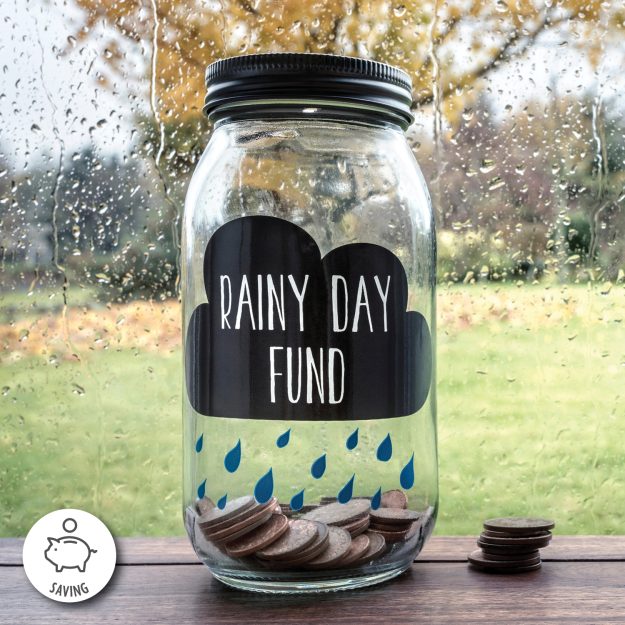Unpredictability is a part of life. Everything may be going well one minute, and then an unforeseen circumstance, such as a medical emergency, a job loss, or auto maintenance, may cause financial chaos. Because of this, having an emergency fund is not just a wise financial decision, but also a need. You can weather any storm without letting your long-term objectives fall by being ready for life’s “rainy days,” which guarantees stability and peace of mind.

What is an Emergency Fund?
An emergency fund is a special savings account created to pay for unanticipated costs. In contrast to typical savings, this fund is intended for unforeseen expenses like medical bills, house repairs, or unexpected income loss rather than for planned purchases or trips. It serves as a safety net for money in case something unforeseen occurs.
Why is an Emergency Fund Essential?
Reserve for Unexpected Costs
There is no notice for emergencies. Having money on hand guarantees you can manage the issue stress-free, whether it’s a large medical bill or an unforeseen travel brought on by a family emergency.
Avoiding Debt
If you don’t have an emergency fund, you may use loans or credit cards to pay for things. This frequently results in debt with hefty interest rates, which exacerbates financial issues. You can avoid falling into this trap by having an emergency fund.
Net of Job Security
Losing a job suddenly can be traumatic. An emergency fund serves as a safety net, ensuring that you don’t forgo necessities as you search for fresh chances.
Safeguards Long-Term Objectives
Without a safety net, you may have to sell investments or take money out of your retirement account, which could put your future goals in jeopardy. By preserving your money, an emergency fund safeguards your long-term objectives.
How Much Should You Save?
Saving three to six months’ worth of essential living expenditures is a good general rule of thumb. For example:
Aim to save between ₹90,000 and ₹1,80,000 if your monthly costs are ₹30,000.
The following variables affect how much money you have set aside for emergencies:
Employment Stability
People who work as freelancers or have erratic employment may require a greater budget.
Family Size
Families that are single-income or have dependents might need to save more money.
Lifestyle and Expenses
A larger fund may be required due to increased living expenses or frequent travel.
Steps to Build Your Emergency Fund
Get Started Small
Start with a little goal, like ₹5,000 or ₹10,000. Reaching minor goals will encourage you to continue.
Set Up Savings Automatically
Every month, set up automated transfers to a certain account. This lowers the incentive to spend and guarantees stability.
Reduce Non-Essential Spending
Cut back on frivolous expenses, such as eating out or pointless subscriptions, and put the money saved into your emergency fund.
Make use of windfalls or bonuses.
Put any unforeseen cash, employment bonuses, or tax returns straight into your emergency fund.
Monitor Your Progress
To keep yourself motivated, keep a close eye on your savings and recognize your accomplishments.
Where to Keep Your Emergency Fund
An emergency fund should be easily accessible and safe. Consider these options:
High-Yield Savings Accounts: These provide interest while keeping your money liquid.
Money Market Accounts: Offer higher returns than standard savings accounts with similar accessibility.
Fixed Deposits (FDs): These provide better returns but may require breaking the deposit in emergencies.
Avoid putting your emergency fund in stocks or volatile assets, as market fluctuations can reduce its value when you need it most.
When to Use Your Emergency Fund
It’s important to reserve your emergency cash for actual crises like:
- Medical expenses that insurance does not cover.
- Unexpected auto or home repairs.
- Costs incurred right away after losing a job.
- This fund is meant to protect your financial well-being, so resist the temptation to use it for non-essential expenses like shopping or trips.
The Peace of Mind Factor
An emergency fund’s worth extends beyond its monetary value; it provides comfort. You can make judgments without panic and experience less stress when you know you’re ready for anything. It gives you security in tumultuous times so you may concentrate on finding answers rather than rushing to find money.
Final Thoughts
Taking charge of your financial destiny is the key to being “rainy day ready.” An emergency fund is a tool that gives you the courage to face life’s obstacles, not just a safety net. Begin modestly, maintain consistency, and gradually increase your funds. Keep in mind that even if a storm strikes without warning, you will always have a place to stay if you have a prepared emergency fund.
~By Anamika Vishnoi, IMS Ghaziabad

